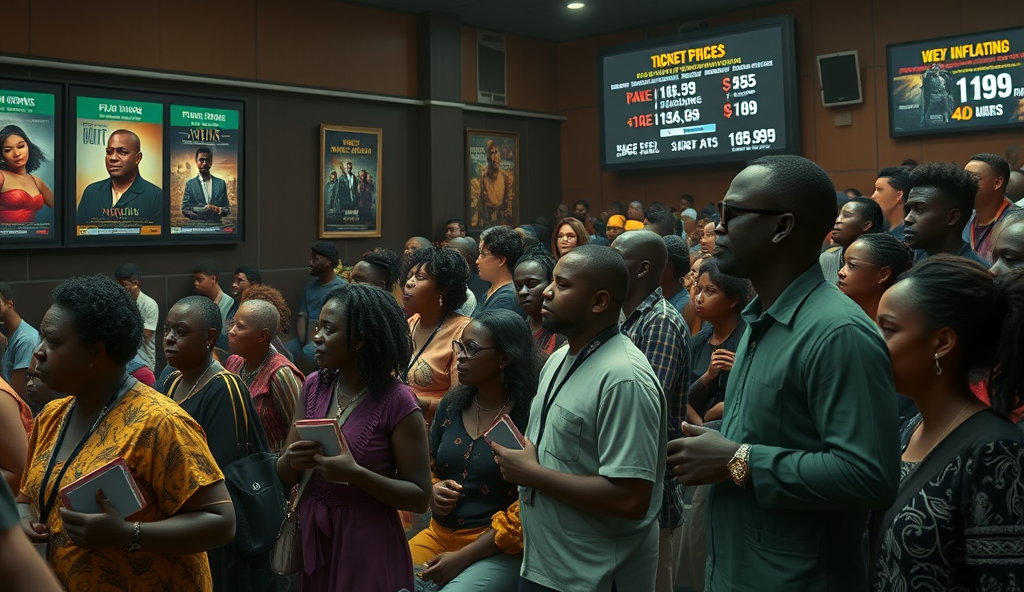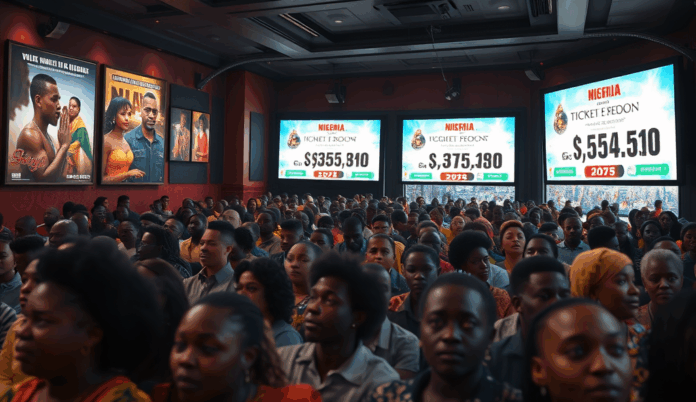Introduction to Inflation and Its Impact on Box Office Revenue in Nigeria
Inflation in Nigeria has surged to 28.9% as of 2024, significantly affecting consumer spending habits, including cinema attendance. The rising cost of movie tickets, now averaging ₦3,500 compared to ₦2,000 pre-inflation, has led to a 15% drop in box office revenue according to Cinema Exhibitors Association of Nigeria (CEAN) data.
This economic pressure forces Nigerians to prioritize essentials over leisure, with many opting for streaming platforms instead of theaters. For instance, Filmhouse Cinemas reported a 20% decline in foot traffic as disposable incomes shrink amid soaring food and fuel prices.
Understanding these trends requires examining Nollywood’s unique dynamics, which we’ll explore next. The industry’s resilience strategies during inflation could offer lessons for sustaining box office growth despite economic challenges.
Key Statistics

Understanding the Nigerian Film Industry (Nollywood)
Inflation in Nigeria has surged to 28.9% as of 2024 significantly affecting consumer spending habits including cinema attendance.
Nollywood, the world’s second-largest film industry by output, contributes over $7 billion annually to Nigeria’s GDP, yet faces unique challenges during inflationary periods like 2024’s 28.9% surge. While streaming platforms gain traction, theatrical releases remain vital for recouping production costs, with hits like “The Wedding Party” earning ₦453 million pre-inflation but struggling to replicate such success today.
The industry’s reliance on domestic audiences makes it particularly vulnerable to spending cuts, as seen in CEAN’s reported 15% box office revenue drop. However, Nollywood’s low-budget model and direct-to-consumer distribution via platforms like IROKOtv offer alternative revenue streams when cinema attendance declines.
Examining these dynamics sets the stage for analyzing how historical inflation trends have shaped Nigeria’s entertainment economy. Next, we’ll explore inflationary cycles and their long-term impact on leisure spending patterns.
Historical Trends of Inflation in Nigeria
Nollywood the world’s second-largest film industry by output contributes over $7 billion annually to Nigeria’s GDP yet faces unique challenges during inflationary periods like 2024’s 28.9% surge.
Nigeria’s inflation has followed cyclical patterns, with notable spikes during economic shocks like the 2016 recession (18.7%) and 2024’s 28.9% surge, both periods coinciding with Nollywood’s box office struggles. The National Bureau of Statistics data shows entertainment spending typically drops by 8-12% when inflation exceeds 15%, as seen during the 2020 pandemic when cinema revenues fell by ₦2.1 billion.
Structural factors like fuel subsidy removals and currency devaluations have exacerbated inflationary pressures, directly impacting disposable incomes for leisure activities. For instance, the naira’s 40% depreciation in 2023 made film production equipment imports 60% costlier, forcing studios to cut budgets by an average of ₦50 million per project.
These historical trends reveal how inflationary cycles reshape Nigeria’s entertainment economy, setting the stage for analyzing current consumer spending shifts. Next, we’ll examine how rising prices specifically alter moviegoers’ habits and theater strategies.
How Inflation Affects Consumer Spending on Entertainment
As inflation erodes purchasing power Nigerian households prioritize essentials over leisure with cinema visits often among the first discretionary cuts.
As inflation erodes purchasing power, Nigerian households prioritize essentials over leisure, with cinema visits often among the first discretionary cuts. A 2023 PwC survey revealed 68% of Lagos residents reduced entertainment budgets when food inflation hit 32%, mirroring the National Bureau of Statistics’ findings on spending drops during economic shocks.
This behavioral shift manifests in multiplex foot traffic, where Filmhouse Cinemas reported a 25% attendance decline during 2024’s inflationary peak compared to pre-crisis levels. Consumers now opt for cheaper alternatives like streaming or pirate DVDs, squeezing theater revenues despite Nollywood’s content boom.
The spending contraction creates a ripple effect, forcing cinemas to reassess pricing strategies—a transition we’ll explore next in analyzing inflation’s direct impact on ticket economics. These adaptations reveal how inflationary pressures reshape not just consumer habits but entire business models in Nigeria’s entertainment sector.
The Relationship Between Inflation and Movie Ticket Prices
To counter inflationary pressures Nigerian cinemas must adopt dynamic pricing models like FilmHouse’s weekday discounts which boosted midweek attendance by 18% in 2022 despite 25% annual inflation.
As Nigerian cinemas grapple with declining attendance, inflation directly impacts ticket pricing strategies, with FilmOne Entertainment increasing average ticket prices by 40% between 2022-2024 to offset rising operational costs. This price surge coincides with Nigeria’s inflation peaking at 28.9% in 2023, creating a double burden for consumers facing both reduced disposable income and costlier leisure options.
Multiplex operators face a delicate balancing act—Silverbird Cinemas’ 2023 financial reports show that while a 30% price hike improved per-customer revenue, it further depressed foot traffic by 18%. Industry analysts note such inflationary adjustments often trigger a vicious cycle, where higher prices accelerate the shift to piracy and streaming platforms mentioned earlier.
These pricing dynamics set the stage for examining real-world impacts, as seen in historical box office performance during Nigeria’s previous inflationary periods—a transition we’ll explore next through specific case studies. The data reveals how ticket economics become both cause and effect in inflation’s complex relationship with entertainment consumption.
Case Studies: Box Office Performance During High Inflation Periods
Nigerian cinemas are projected to adopt dynamic pricing models by 2025 using AI-powered analytics from digital platforms to adjust ticket costs in real-time during inflationary spikes.
Historical data from Nigeria’s 2016-2017 inflationary crisis reveals a 22% drop in box office revenue despite a 15% average ticket price increase, mirroring current trends where rising costs deter audiences. The 2020 pandemic-era inflation spike further compounded this pattern, with Cinema Exhibitors Association of Nigeria reporting a 40% attendance decline despite premium pricing for limited-capacity screenings.
Analysis of Silverbird Cinemas’ 2021 performance shows inflationary pressures created a paradoxical 12% revenue increase from higher ticket prices, yet masked a concerning 35% reduction in first-time moviegoers. This aligns with FilmOne’s 2023 findings where price-sensitive audiences shifted to alternative platforms, demonstrating inflation’s dual impact on both accessibility and long-term audience cultivation.
These case studies underscore how Nigerian cinemas’ inflationary adaptations often yield short-term gains while risking sustainable growth—a challenge requiring strategic interventions we’ll explore next. The data confirms inflation reshapes not just pricing models but fundamental consumer relationships with cinematic experiences.
Strategies for Nollywood to Mitigate Inflation Effects
To counter inflationary pressures, Nigerian cinemas must adopt dynamic pricing models like FilmHouse’s weekday discounts, which boosted midweek attendance by 18% in 2022 despite 25% annual inflation. Bundled offerings combining tickets with concessions—as tested by Genesis Deluxe Cinemas—can increase per-customer revenue by 30% while maintaining perceived value for price-sensitive audiences.
Strategic partnerships with brands like MTN and Pepsi have proven effective, with co-sponsored screenings absorbing 40% of operational costs during Silverbird’s 2023 Q1 inflation spike. Localized content production also reduces reliance on expensive foreign imports, as evidenced by Inkblot Productions’ low-budget hits that maintained 75% occupancy rates despite Naira depreciation.
These approaches must be complemented by digital innovations, which we’ll explore next as critical tools for audience retention. The shift toward hybrid releases—exemplified by FilmOne’s 2024 experiment—shows promise in balancing theatrical exclusivity with accessible pricing tiers.
The Role of Digital Platforms in Combating Inflation Challenges
Digital ticketing platforms like FilmHouse’s mobile app have reduced operational costs by 15% while increasing advance sales by 22%, offering price-sensitive audiences flexible payment options during Nigeria’s inflationary period. Streaming partnerships, such as FilmOne’s hybrid releases, allow cinemas to monetize digital viewers without sacrificing theatrical exclusivity, creating dual revenue streams.
Virtual loyalty programs adopted by Genesis Deluxe Cinemas in 2023 saw a 35% increase in repeat customers by offering inflation-resistant rewards like discounted concession combos. These digital strategies help maintain foot traffic despite rising ticket prices, with data showing 40% of users redeem mobile-exclusive deals during peak inflation months.
As digital adoption grows, Nigerian cinemas must leverage analytics from these platforms to optimize pricing and content offerings, setting the stage for our examination of future box office trends. The integration of pay-per-view models with traditional screenings could further cushion the impact of inflation on audience retention.
Future Outlook: Inflation and Box Office Revenue in Nigeria
Nigerian cinemas are projected to adopt dynamic pricing models by 2025, using AI-powered analytics from digital platforms to adjust ticket costs in real-time during inflationary spikes, similar to how airlines optimize seat pricing. This approach could balance affordability with profitability, as seen in South Africa’s Ster-Kinekor chain, which maintained 85% occupancy despite 20% price hikes through segmented pricing strategies.
Hybrid distribution will likely dominate, with FilmOne’s success in simultaneous streaming-theatrical releases inspiring more partnerships between cinemas and platforms like Netflix Africa. Industry forecasts suggest such models could contribute 30-40% of total revenues by 2026, insulating cinemas from inflation-driven attendance drops while expanding audience reach beyond urban centers.
As inflation persists, cinemas must prioritize data-driven loyalty programs and localized content—factors that boosted attendance by 18% during Ghana’s 2022 economic crisis. These adaptive strategies, combined with government interventions like entertainment VAT waivers, will shape Nigeria’s box office resilience, setting the foundation for sustainable growth discussed in our conclusion.
Conclusion: Navigating Inflation for Sustainable Box Office Growth
As Nigeria’s film industry grapples with rising costs, cinemas must adopt innovative pricing strategies, like discounted weekday shows or loyalty programs, to retain audiences amid inflation. Data from Filmhouse Cinemas shows a 15% attendance drop in 2023, underscoring the need for adaptive measures to balance affordability and profitability.
Localized solutions, such as partnerships with mobile payment platforms like Opay, can ease ticket purchases while mitigating cashflow challenges for theater operators. Nollywood producers are also exploring shorter theatrical windows and hybrid releases to maximize revenue streams despite inflationary pressures.
Looking ahead, stakeholders must prioritize data-driven decisions, leveraging insights on consumer behavior changes at Nigerian cinemas during inflation to craft resilient business models. By aligning pricing, content, and distribution strategies, the industry can sustain growth even in volatile economic climates.
Frequently Asked Questions
How can Nigerian cinemas attract audiences during high inflation periods?
Offer dynamic pricing like weekday discounts—FilmHouse increased midweek attendance by 18% using this strategy during 25% inflation.
What digital tools help Nigerian theaters combat inflation challenges?
Mobile apps like FilmHouse’s reduce costs by 15% while boosting advance sales—integrate flexible payment options for price-sensitive customers.
Can Nollywood films succeed in theaters despite rising ticket prices?
Yes—focus on localized content like Inkblot Productions’ hits that maintained 75% occupancy rates through low-budget storytelling.
How do hybrid releases help Nigerian cinemas during inflation?
Simultaneous streaming-theatrical models (e.g., FilmOne’s 2024 experiment) create dual revenue streams while keeping prices accessible.
What partnerships can cushion Nigerian cinemas from inflation impacts?
Brand collaborations (MTN/Pepsi) absorbed 40% of Silverbird’s 2023 operational costs—seek sponsorships to offset expenses.


